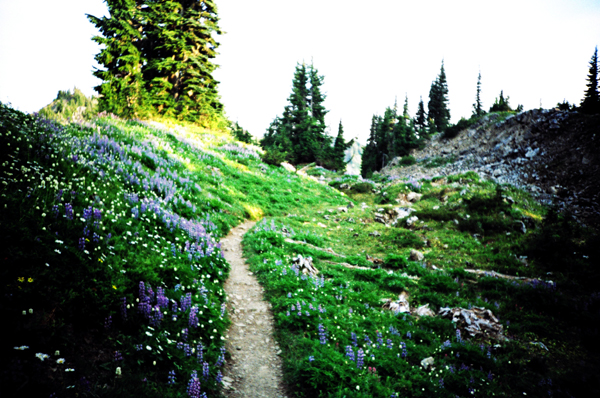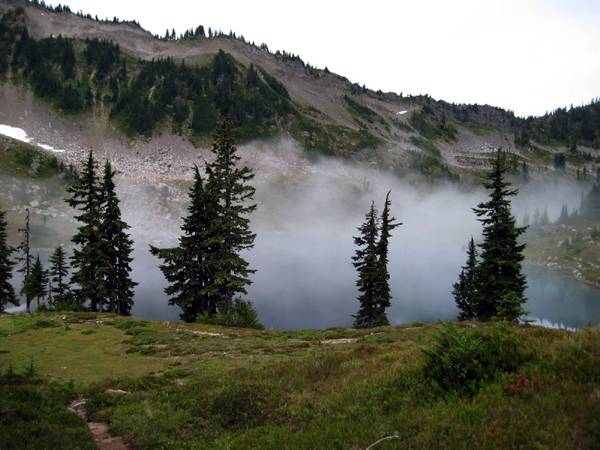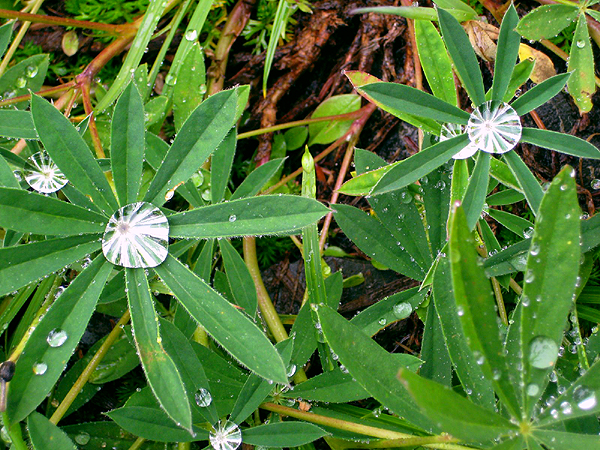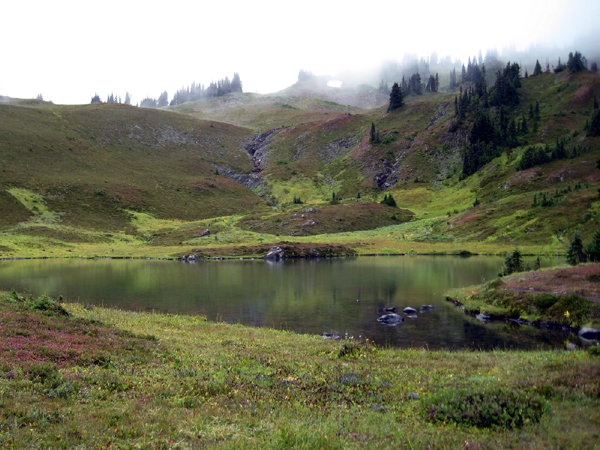10.30.2008 | Seven Lakes Basin

A little over a month ago Tom and I hiked the Seven Lakes Basin, a place I've wanted to visit forever. It's not easy to get to and you need the full four days if you want to say that you really visited the area. It's eight miles in and three thousand feet up that first day to make it to the basin, no small feat for intermittent outdoorsies such as ourselves. There is no short route, so the only people you see are other hikers dedicated to the long haul.
As the date of the trip approached, I began to dread the insurmountable chill and a pack that bores into the skin until it anchors itself to the bones. Then it occurred to me: It was ridiculous not to have replaced them by now, especially since I can afford to do it. So I did it, replaced those—hate to say it—20-year-old relics. After much trying on, I settled on a new, gentler-seeming pack, up-to-date with 21st Century style. As for the sleeping bag, might as well go for the best: a Feathered Friends down bag.
The first day was more rewarding than arduous. These days, I'm never prepared for the mental easiness of doing a single activity, instead expecting the fatigue to be total. But the exertion is only physical, stressless; the mind is liberated to wander as it will, supported by the body's contented ableness. It's surprising, and a little sad.
All along the high slopes the meadows were starting to crimson and the low angle of the sun's advanced retreat to the south made the shadows from those tiny many-shaped leaves and needles long and spectacular. Blueberries were still ripe and plentiful even though the persistent leaflets tended yellow and red.
The panoply of complex shapes and patterns strained my vision. Things looked hypercomplex, too sharp. I pondered that for a long while. Except for that narrow diversity of city foliage, I mostly look at large manmade geometrical shapes. I wondered, what fundamental cognitive ability is diminished by this dumbing of the visual field?
We heard elk bugling that first day, for hours as we climbed the stony-stepped trail from Deer Lake to the High Divide. The sturdy and stunted alpine spruces were waist-high, leaving mile-long sights clear, but we could never see that strange chanter.
On the High Divide, we caught the last of the sun over the Pacific, a haze already settling into the long flue of the Hoh river valley all the way to the sea. Over craggy ridges to the east, Olympus loomed crisp and still white. Underfoot, the happy summer grasses and latter-day wildflowers, quivering spritely in the last of the warm breezes.
It was a long haul. I'd estimated six hours of hiking to go the eight miles and 3000 feet, and I was about right. We crested the ridge at dusk and dropped down the bouldered escarpment to the Seven Lakes Basin in the waning light. The tarns reflected the remaining day in their cloudy cyan depths, and we hunted for camp by that glow, settling on one above Lunch Lake that was not far from the privy but not too close either. Other hikers were camped nearby, but the area was nowhere near crowded. A chill settled and clinched, as if to make the point of the distance from civilization. The stars appeared and with them the most intense depth of field known to us. We ate and stowed our things and then gladly quit exertion for fast sleep.

For the first time in my life, I was warm while I slept in camp—and comfortable.
We slept late into our rest day. Slept some more and read and ate. We dressed warmly and hiked the meandering footpaths that connected campsites, clifftop views, and, of course, the many lakes. We had followed a faint and steep path that flanked the gregarious little creek that outlets from Lunch Lake and found ourselves oddly in a field of wildflowers that thrived atop the suddenly dry bed of the creek, where it had obviously and strangely gone underground. There, amid the wildflowers was a marmot, bolt upright. We had only just begun to feel the delight of that happenstance when movement from the periphery distracted us. Across Round Lake from where we stood was a black bear some 200 yards above us, stuck to the cliff grazing on the bounty of blueberries that also clung there. Just as we deigned to be astonished, an enormous water bird of some kind glided gently and heavily to a landing on one large stone among the rockfall below the bear. What the heck is that thing and what is it doing up here at 5,000 feet?! Wondering what else might appear from nowhere, we sat down on the shore and waited a good long while.
In the evening it began to rain, lightly and coldly. We slept through a night of it and woke to its persistence. We ate and began to break camp, and that's when I made the slightest bend to pick up a towel from my pack and felt a muscle in my lower back give and shudder. The ensuing pain snapped me upright as that marmot from the day before, and I stood there with my vision white and nausea creeping up my throat. I stayed like that, warding off Tom's offers of assistance until finally I thought that I could sit. So I did, waiting out the nausea.
You think about your options. Stay there while Tom hikes a full day for help. Take a massive dose of ibuprofen and see if things improve once the muscles warm up. What would you do? I went for the latter, not being able to imagine waiting it out.
Tom handled the parts of packing that required bending and held my pack so that I could slide into it. We started out and it hurt to bear weight on that side, the right side, but I could walk OK. Eventually, the pain dulled and became just another sore noise in the constellation of them coming from the remote places of my body.

We climbed up out of there on wet boulders toward the pass and joined the High Divide trail heading east. We were in the clouds and skirted the ridge in alternating mist and rain the entire day, passing other slickened hikers telling of bear at the junction of the Hoh Lake trail and at Heart Lake. (Never saw the bear, but we did encounter a pair of grouse.) We gazed at the blinding white expanse where the sharp textures of Olympus would be if the views were clear. To the left the meadows sloped away to tarns near and far, the whole of it looking subarctic. I don't know what Tom was thinking, but I was already wondering how and when I could return to chance another opportunity for a view.
We lunched at Heart Lake, the sweetest little drop of water I've ever seen. It rained the while and we ate swiftly under cover of our parka hoods. Not a bear in sight.

After, we descended a fairy-tale land of flower-flanked streamlets that fell playfully down the assertive slope of the still-lush meadow, gaining momentum and power until they became the roiling Soleduck.
Under the treeline, the path became muddy and dark. We paused at the campground we'd aimed for but found it too muddy and gloomy for camping. We walked on. At about 5 miles from the trailhead, we entered a wide camp next to the river that was sheltered by the high canopy of ancient trees. It was dry, but you could see concentric rings of needles where water had pooled. We chose our tent spot carefully, staking it to a slight incline beyond the rings. With camp established and wet gear hung from the stumps of branches long ago amputated for firewood, we selected from the last of our damp provisions and cooked up a storm. Extra chocolate for all! It started to rain a little and then suddenly a lot. Big drops plunked into our dishes and cups and sizzled where they stung the stoves. We stowed the hanging gear and hurried to finish dinner, again taking refuge under the brims of our hoods and later under the wide trunks where there was a bit of a rain shadow.
A lake had formed and filled the circles. So much water had accumulated in that short spell of supper that it threatened the bottom edge of the tent. Tom dug a trench to relieve the pooling, but it quickly filled with needles and he had to dig it deeper two more times before it looked like the drainage was the stronger force. Satisifed that we would not wake submerged, we dove into the tent and marveled at how a thin, water-soaked sheet of nylon could withstand the barrage this one was currently enduring. We were warm in dry socks and dry, down sleeping bags.
The rain stopped sometime in the night and I woke in the blackness to the sound of a jet overhead. I slept again for a while and woke again when Tom left the tent. The soft needle-laden ground had consumed all the water and the nylon was already drying in places. We ate fast, ate the last, packed up, and got out of there, damp. It was a five-mile sprint in the dark open of an old growth forest. The trailhead, of course, was victory.